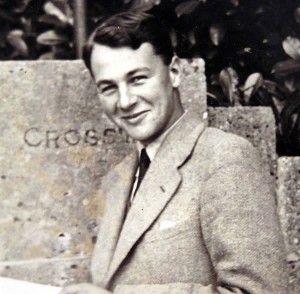Last weekend I posed a meal-time question to my wife and a couple of our friends: “If you could choose five influential people from the last 100 years or so and spend one day with each, who would you choose?” I had an unfair advantage as I had already been pondering my list for a couple of weeks. My list included Abraham Kuyper, Francis Schaeffer, Mother Teresa, Dietrich Bonhoeffer, and John Stott. All five have taught me something significant about the essence of the Christian faith.
Yesterday, my list became my version of Mitch Albom’s five people to meet in heaven as John Stott passed from this life into life eternal. I learned the news during a pause in my bike ride. Checking my phone after hearing a chirp, I spotted an email from our former CPYU Board member and President of John Stott Ministries, David Jones. The email informed me that Stott had passed away just a short time earlier.
Strangely enough, just the day before Scot McKnight had posted the picture you see here on his Facebook page. It’s part of a little photo quiz he regularly posts. Scot asked, “Who is this? And what was he famous for?” I quickly posted, “John Stott? If that’s Stott, he’s known by me for influencing my life and theology in big ways.”
From time to time over the course of the last few months I’ve wondered how much more time Stott would be granted on this earth. To be honest, I was saddened but still smiled as I stood there on the side of the road thinking about his passing. The church has lost a great leader. Stott, however, is realizing all that he lived for. Thankfully, his legacy and leadership will remain through his vast writings.
If I could snap my fingers and have younger Christians, youth workers, and parents become familiar with one theologian, it would be John Stott. His writings are deep yet accessible. They are extremely practical. Stott had a gift for making that which was complex, understandable for people like me. His books Basic Christianity, The Cross of Christ, Evangelical Truth, The Radical Disciple, and The Contemporary Christian are among my favorites. The latter is one that I require students to read. It’s powerful, convicting, and life-shaping.
I love this summary of Stott’s core values as posted by Mel Lawrenz on The Brook Network. . .
. Make personal devotion to God in Christ our highest priority.
2. Live consistently, with integrity. Resist the temptation to develop a public persona.
3. Develop core disciplines like Scripture reading and mediation, prayer, work and rest.
4. Trust in the unchangeable truth of Scripture. Go deep in our study of it.
5. Prepare public talks with a focus on substance. Look for the connections and orders of our ideas.
6. Value relationships with other leaders. Be a mentor without having to be called a mentor. Follow natural patterns. Don’t reduce discipleship to a program.
7. “Read” the truth of God written in the natural world. Stott was an avid ornithologist. His cumulative knowledge made him a world expert. This was both an avocation and an act of worship. Like many other Christian leaders, Stott practiced a full awareness of God’s presence and work, and that included participating in the Creation with a developing sense of awe and wonder.
In the 24 hours since Stott’s passing, I’ve noticed several people asking others for their favorite Stott quote. That’s a hard one. There are so many out there. I’ll pass on one that I consistently share in my seminars with youth workers and parents. It captures the essence of our calling as people who are to be in but not of the world. This one’s from The Contemporary Christian – “We stand between the Word and the world with consequent obligation to listen to both. We listen to the Word to discover even more of the riches of Christ. We listen to the world in order to discern which of Christ’s riches are needed most and how to present them in their best light.”
Today, I am thanking God for the gift of John Stott.


Thanks for sharing your thoughts Walt, loved reading this!
This is how I know the resurrection of Christ is real and powerful…when we can look upon the death of one of His followers with joy and celebration. Thanks for sharing. 🙂
Walt,
Thanks so much for sharing your thoughts on this film. I am currently watching it and I can really see the agenda of erasing youth ministry in and through the conversation happening in this movie. I am very alarmed that someone would even take this platform and say that youth ministry isn’t effective and should be erased essentially. Youth ministry is saving the lives of our students who would other wise be thrown out to the waysides of the world so why would we erase it. I also feel as if the leaders being spoken to were cut off or their comments were not fully exposed. I am finding myself as youth leader very frustrated and sad by what I am seeing in this film.